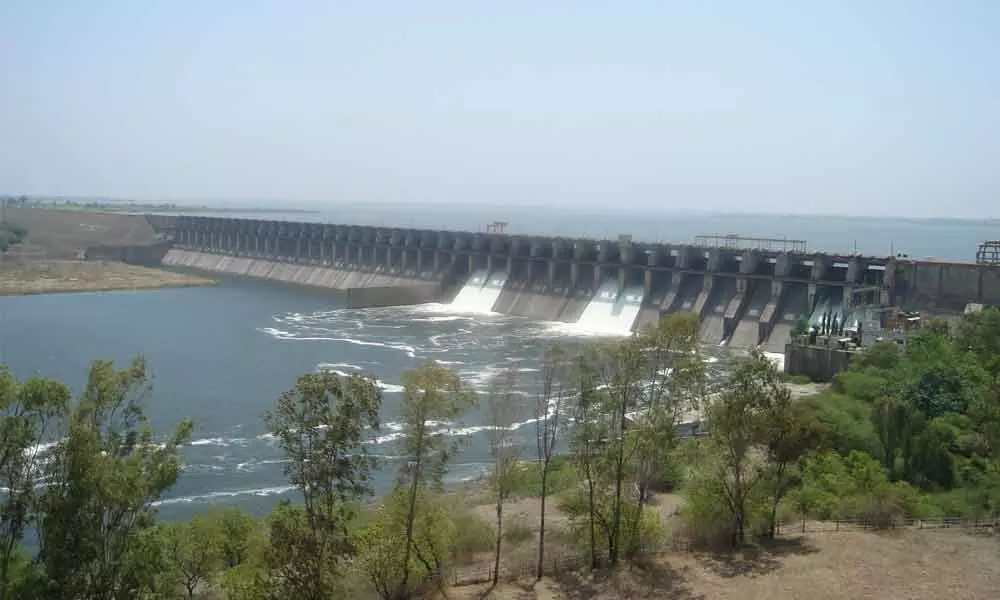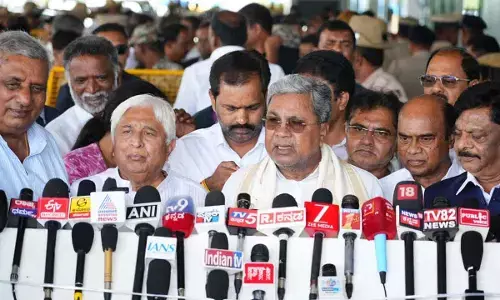Central authority to manage rivers

Another Bill that gives more powers to bureaucrats at the Centre over interstate river basins is going to become law. Here the Chief Ministers of States of 13 river basins will advise.
Another Bill that gives more powers to bureaucrats at the Centre over interstate river basins is going to become law. Here the Chief Ministers of States of 13 river basins will advise.
Public representatives will be consultants and their body called 'council' while the body of public servants called 'authority' will decide how to develop, conserve and distribute the resources in interstate river basins.
The Centre is purportedly implementing the recommendation of two Commissions – the Second Administrative Reforms Commission (II ARC) and National Commission for Integrated Water Resources Development (NCIWRD) through a new Bill to manage the river basins.
The 2nd Administrative Reforms Commission (II ARC) in February 2008 suggested setting up of River Basin Organisations (RBOs) for each interstate river by new law replacing the River Boards Act, 1956.
The NCIWRD in its report in 1999 recommended for River Basin Organisations (RBOs) with the representatives of the concerned State governments, local governments and water users that will act as a forum for mutual discussions and agreement.
It also recommended for a General Council with a Minister representing the State, the leader of the Opposition, representatives of selected Panchayats and urban local bodies from each district in the basin and representatives of water districts from each district in the basin.
The Bill provided no role for Opposition, local bodies and water districts.
The II ARC suggested a national water law, subject to Constitution the provisions of the Constitution and relevant laws, responsibility for the development, apportionment and management of available water resources will vest with the basin or regional level in such a manner to enable the interested parties to participate fully.
This Bill is directly linked with another Bill on Interstate river water disputes. Under each Bill, a Central body is created with officers who work above the State governments and their representatives.
Award of Tribunals on interstate river waters is always resisted by one State or other. They desist its implementation and litigate it. For decades, the disputes continue.
They do not care the express provisions in the Constitution regarding the finality of such awards because of political reasons and emotions.
Article 262 (1) already bars the jurisdiction of the Supreme Court but matters are still being taken there on related legal, jurisdictional, environmental and constitutional issues.
The II ARC suggested that the Chairman of all the River Basin Organisations, as and when formed, may be made members of the Council.
But this suggestion was ignored by the Centre while drafting Bills for Interstate River Water Disputes Amendment Bill 2019 and River Basin Management Bill 2019.
River Basin Management Bill
The Ministry claimed that this draft will help optimum development of interstate rivers by facilitating interstate coordination ensuring scientific planning of land and water resources taking basin/sub-basin as unit with unified perspectives of water in all its forms (including soil moisture, ground and surface water) and ensuring comprehensive and balanced development of both catchment and command areas.
The Bill proposed to establish 13 River Basin Authorities for various river basins of the country.
Two-tier structure
Every Interstate River Basin Authority will have two-tier structure. It shall consist of a Governing Council and Executive Board.
The lower tier 'Executive Board' of a river basin is represented by various relevant faculties from each riparian State including union government.
The 'Governing Council', top tier consists of Chief Ministers of basin States or Union Territory, Minister in charge of Water Resources from each State.
Chairperson of Governing Council will be a Chief Minister of member States, which will be by rotation and they hold office for one year. If the Chief Ministers do not arrive at a consensus candidate, the Centre will appoint one Chief Minister as chairperson.
The members of the Council are expected to arrive at unanimous decisions, if not, the dispute would be referred to the tribunal formed under Interstate River Water Disputes Act, 1956.
Executive Board: The chairman of the Executive Board, the lower tier, will be the Additional Secretary rank officer from CWC. Procedure in discharging the powers will be as prescribed by the Centre.
This Board is a permanent establishment. This will be guided by the advice given by the Governing Council.
This means real power is vested in Executive Board, and the Governing Council, though considered top tier will only advice. The Chairman of Governing Council will be advised by an Advisory Council.
The Executive Board has more and real powers to plan and implement the same. Board will decide on demand and supply and disaster situations arising in the basin from time to time.
Section 20 says the Chairman of Executive Board shall exercise the administrative and financial powers as delegated by Central government or the Governing Council.
Chairman of Executive Board shall exercise powers as delegated to him by the Central government or Governing Council (S 20).
RBA may acquire, hold and dispose of property; survey, inspect, research, collect data, publish statistics, (s 21). S 22 says that the recommendations are binding. Section 16 deals with the Advisory Council - the River Basin Master plan must be prepared by RBA.
In fact, the Executive Board will prepare it. The Governing Council has power to approve it. It is clear that the real power vests in Chairman of the Executive Board.
Right given & taken away
Section 3 says river basin States have right to participate in the development, management and regulation of waters of an interstate river basin. The decision of the Authority shall be binding on all the basin States.
Section 3 gives right to participate, and its second part takes it away by saying decision of Authority is binding.
Duties of States are listed as follows: S 4: duty to cooperate, S 5: Shall manage in equitable manner, S 6: Conjunctive management of surface water and river-basins, and S 7: Integrated management: best efforts to integrate management of waters with other resources.
The water is common pool community resource. S 8: Duty to deal with water in public trust. Public Trust Doctrine to achieve food security, support livelihood. S 9. Duty to give priority to demand management of water.
Centre's Power
The interstate river basins are mentioned in Schedule 1: and the Centre can amend Schedule by a notification. The Centre demarcate the limits of all the interstate river basins. (Section 10). The Centre will establish Interstate River Basin Authority for development and management (S 11).
For sub-basin also an authority may be created. Umbrella Authority RBA can also be created for more than one river basins. Complete powers regarding its place and name etc are with the Centre.
The Centre will decide about its functions and powers also. The Centre delegates the power to the Executive Board Chairman.
The Bill claims to implement suggestions of two commissions but violates its valid recommendations. Though commissions suggested more power to local bodies and to facilitate their participation in decision making, Centre totally ignored them.
There is no consultation with States and stakeholders. The power from Chief Ministers will be taken to the Centre only to be placed in the hands of the Secretary. Though the public representative body is envisaged, it can only 'recommend' and it has onerous duty to abide by the directions of the 'authority'.
Interestingly, the Bill emphasises more on 'demand and supply' of water instead of focussing on conservation and protection of rivers. This means exploitation of resources is considered more important than the conservation.
(The writer is Dean, Bennett University and former Central Information Commissioner)










